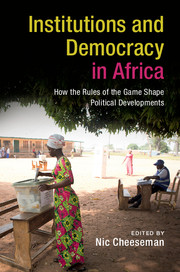Book contents
- Frontmatter
- Dedication
- Contents
- List of Figures
- List of Tables
- List of Contributors
- 1 Introduction: Understanding African Politics: Bringing the State Back In
- Part I Institutional Foundations
- Part II Law and Order
- Part III Elections, Parties and Political Competition
- 8 Political Parties: Presidential Succession Crises and Internal Party Democra
- 9 Elections: The Power of Elections in Multiparty Africa
- 10 Electoral Rules: The Relationship between Political Exclusion and Conflict
- 11 Term Limits: Leadership, Political Competition and the Transfer of Power
- Part IV Countervailing Institutions
- Index
- References
10 - Electoral Rules: The Relationship between Political Exclusion and Conflict
from Part III - Elections, Parties and Political Competition
Published online by Cambridge University Press: 05 February 2018
- Frontmatter
- Dedication
- Contents
- List of Figures
- List of Tables
- List of Contributors
- 1 Introduction: Understanding African Politics: Bringing the State Back In
- Part I Institutional Foundations
- Part II Law and Order
- Part III Elections, Parties and Political Competition
- 8 Political Parties: Presidential Succession Crises and Internal Party Democra
- 9 Elections: The Power of Elections in Multiparty Africa
- 10 Electoral Rules: The Relationship between Political Exclusion and Conflict
- 11 Term Limits: Leadership, Political Competition and the Transfer of Power
- Part IV Countervailing Institutions
- Index
- References
Summary
In Liberia's 1927 election, C.D.B. King, the candidate of the True Whig Party, faced T.J.R. Faulkner, the opposition leader of the People's Party. It was a lopsided victory for the incumbent True Whigs, as their candidate won an official tally of 243,000 votes, compared to just 9,000 for the People's Party. There was just one problem. Formal rules on voter eligibility were so strict that only 15,000 people were legally allowed to cast ballots in Liberia by 1927 (Kieh Jr. 2003: 202). The election was certainly rigged. Either each eligible voter had cast an average of seventeen ballots apiece (and most of them in favour of the True Whigs), or hundreds of thousands of ineligible voters were allowed to vote.
It is no surprise that African elections in 1927 were arenas of competition that had little regard for formal rules. Such events are rare today. Increased importance has been given to formal electoral laws, although official regulations are certainly not ironclad guarantors of electoral behaviour. Degrees of electoral manipulation were commonplace in the intervening decades – throughout the era of paternalistic colonialism, ‘Big Men’ and one-party states, and finally the third wave of democracy that swept across the continent in the 1990s (Huntington 1991). There are endless examples of African elites contravening electoral institutions in order to illegitimately gain an upper hand (Chaturvedi 2005; Calingaert 2006; Aalen and Tronvoll 2009; Beaulieu and Hyde 2009; Collier and Vincente 2012; Cheeseman 2015). However, the interaction between formal and informal rules is markedly different than it was when the True Whigs blatantly stole an election with an obviously implausible vote tally. Today, only amateurs steal elections by brazenly breaking the law.
In this chapter, I aim to demonstrate how African electoral manipulation has shifted into a new realm of ‘strategic rigging’, whereby incumbents may bend, re-interpret or change election laws, but always with a critical focus on being perceived as democratic, and in accordance with codified institutions. Elite behaviour in response to institutional change provides an important insight into the role of formal political institutions in Africa: institutions constrain elite action, but may also incentivise new forms of rule-bending or -breaking, in pursuit of the same goals – such as new, but no less insidious, forms of manipulation.
- Type
- Chapter
- Information
- Institutions and Democracy in AfricaHow the Rules of the Game Shape Political Developments, pp. 238 - 259Publisher: Cambridge University PressPrint publication year: 2018
References
- 2
- Cited by



